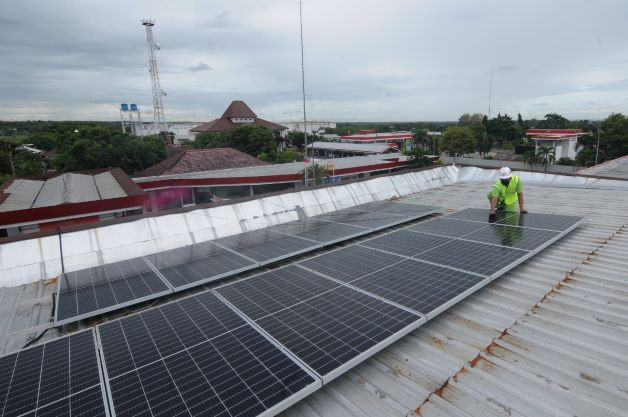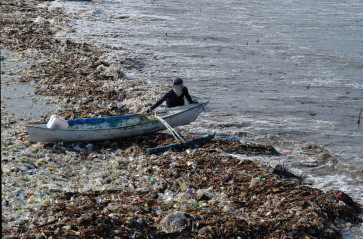Popular Reads
Top Results
Can't find what you're looking for?
View all search resultsPopular Reads
Top Results
Can't find what you're looking for?
View all search resultsMoney laundering in energy efficiency and renewable energy projects
To prevent money laundering, project authorities, government agencies and regulators should establish stringent due diligence procedures, conduct comprehensive background checks on investors and implement robust monitoring and reporting mechanisms.
Change text size
Gift Premium Articles
to Anyone
M
oney laundering is a global concern that affects various sectors, including the energy industry. There is indeed potential for money laundering to occur in energy efficiency and renewable energy projects by using energy service companies (ESCOs).
ESCOs play a crucial role in promoting sustainable energy solutions by offering energy management services and implementing projects to enhance energy efficiency and utilize renewable energy sources. However, the potential risks of money laundering can undermine the integrity and effectiveness of these projects. By understanding and addressing these risks, stakeholders can strengthen the resilience of ESCOs and ensure the sustainable development of the energy sector.
Money laundering is the process of making illegally obtained funds appear legitimate by disguising their true origin. This illicit practice involves three main stages: placement, layering and integration. Money launderers exploit vulnerabilities within the financial system, often using complex networks and transactions to obscure the illicit source of funds.
Energy efficiency and renewable energy projects can become targets for money laundering due to their substantial investments, international collaborations and potential for financial gains.
Suppose there is a large-scale energy efficiency project focused on retrofitting buildings to reduce energy consumption. The project attracts significant investments from various sources, including anonymous offshore entities.
These entities may exploit the complex nature of the project and the involvement of multiple contractors and subcontractors to layer their illicit funds. Through inflated invoices, false claims for energy savings, or collusion with project stakeholders, they could manipulate the project's financials and launder money in the process.
Consider a renewable energy project involving the construction and operation of a solar power plant. The project requires substantial upfront investments, making it attractive to money launderers looking to integrate their illicit funds. They might establish shell companies or use nominee directors to disguise the true ownership of the project.
By infiltrating the supply chain and inflating equipment costs or through fraudulent invoicing, money launderers can introduce illicit funds into the project and subsequently withdraw clean money as project expenses.
These examples highlight how money laundering risks can manifest in energy efficiency and renewable energy projects. To address these vulnerabilities, it is crucial for project authorities, government agencies and regulators to establish stringent due diligence procedures, conduct comprehensive background checks on investors and implement robust monitoring and reporting mechanisms.
Additionally, fostering transparency, encouraging public-private cooperation and promoting awareness among stakeholders can help mitigate the risks associated with money laundering in these sectors.
ESCOs typically engage in large-scale projects that require significant investments, which can attract illicit funds seeking legitimacy. Complex financial structures and transactions within these projects can be manipulated to facilitate money laundering activities.
In some cases, due diligence procedures may not be robust enough to identify the true source of investment in energy efficiency and renewable energy projects. This lack of scrutiny can allow illicit funds to infiltrate the projects unnoticed.
Energy projects often involve collaborations between multiple entities across different jurisdictions. These complex partnerships can create opportunities for money launderers to exploit regulatory gaps and transfer funds illicitly.
Energy efficiency and renewable energy projects often involve substantial investments, government funding and contracts. The financial incentives associated with these projects can attract individuals seeking personal gain through corrupt practices. Stakeholders involved in project planning, procurement and implementation may be susceptible to bribery or kickbacks that lead to money laundering crime.
Money laundering activities associated with ESCOs and their projects can tarnish the reputation of the industry and erode public trust. This can hinder future investments and slow down the adoption of energy efficiency and renewable energy solutions.
Illicit funds injected into energy projects can distort the market, leading to unfair competition and distorted project valuations. This can jeopardize the financial viability of legitimate projects and hinder the growth of the ESCO sector.
Money laundering activities within energy projects can attract the attention of regulatory authorities, leading to increased scrutiny and potential legal consequences. ESCOs must adhere to strict regulatory frameworks to mitigate the risks of money laundering and ensure compliance with anti-money laundering (AML) regulations.
ESCOs should implement robust due diligence processes to assess the legitimacy of funding sources and project partners. This includes conducting background checks, verifying the identities of investors and monitoring financial transactions throughout the project lifecycle.
ESCOs must adhere to anti-money laundering regulations and reporting requirements. This includes implementing Know Your Customer (KYC) procedures, reporting suspicious transactions and cooperating with regulatory authorities to combat money laundering activities effectively.
ESCOs should collaborate with industry associations, financial institutions and regulatory bodies to share information and best practices regarding money laundering risks. This can facilitate the development of standardized guidelines and enhance the industry's resilience against illicit financial activities.
Additionally, it is important to emphasize the importance of international cooperation in combating money laundering in the context of energy efficiency and renewable energy projects. Money laundering activities often transcend national borders, making it crucial for countries to work together to share intelligence, coordinate investigations and enforce anti-money laundering measures.
International organizations, such as the Financial Action Task Force (FATF), play a crucial role in setting global standards and promoting effective measures to combat money laundering. Countries should align their regulatory frameworks with FATF recommendations, ensuring consistency and effectiveness in tackling money laundering risks across borders.
Moreover, the public-private partnerships (PPP) scheme can play a significant role in addressing money laundering in the energy sector. Collaboration between ESCOs, financial institutions, government agencies and civil society organizations can strengthen the collective effort to detect and prevent illicit financial activities. By sharing knowledge, resources and best practices, these partnerships can enhance the capacity of stakeholders to identify and combat money laundering risks effectively.
In conclusion, the potential of money laundering on energy efficiency and renewable energy projects with ESCOs cannot be underestimated. The risks associated with money laundering, including reputational damage, financing risks and regulatory compliance issues, necessitate a proactive and comprehensive response.
By implementing robust due diligence processes, complying with anti-money laundering regulations and promoting collaboration and information sharing, stakeholders can mitigate the vulnerabilities and strengthen the resilience of energy projects.
***
The writer is chief subsection supervisor and an observer of Anti Money Laundering and Counter Financing of Terrorism at the State-owned Banking Supervision Department of the Financial Services Authority (OJK). The views expressed are his own.










